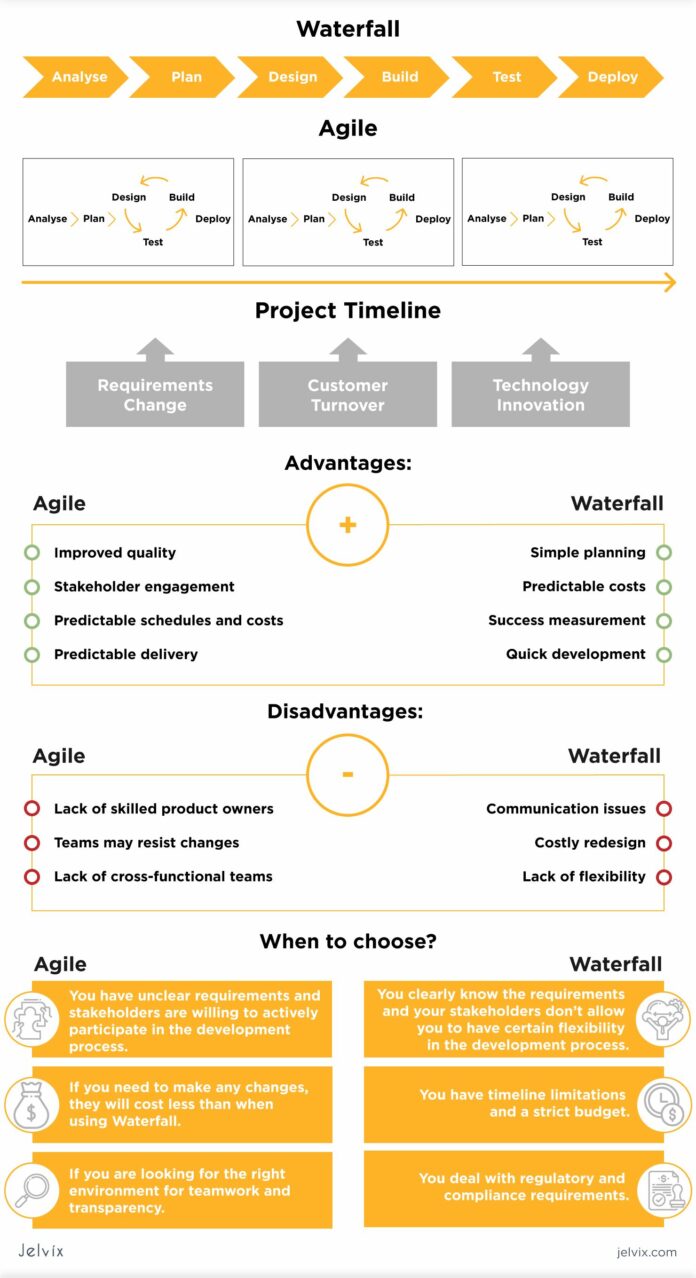Waterfall project management is a popular methodology used by organizations to plan and execute projects. The waterfall approach is a linear, sequential way of managing projects in which each phase must be completed before the next one can begin.
The waterfall approach is often criticized for being inflexible and not adaptable to change. However, proponents of the waterfall approach argue that it is a more disciplined and structured approach that can lead to better project results.
Whether you are a fan of the waterfall approach or not, there is no denying that it is a widely used project management methodology. In this article, we will take a closer look at the waterfall approach, its pros and cons, and how it compares to other project management methodologies such as agile.
Waterfall project management methodology
The waterfall project management methodology is a sequential approach to projects in which each phase must be completed before the next can begin. This linear approach is often contrasted with agile project management, which is more flexible and allows for phases to overlap.
The waterfall methodology was first popularized by the software development community, but it can be applied to any type of project. In a waterfall project, progress flows from the top down in a linear fashion. That is, each phase of the project must be completed before the next phase can begin.
There are several advantages to using the waterfall methodology. One is that it is easy to understand and use. Because each phase must be completed before moving on to the next, there is less room for error and confusion. Additionally, this approach can help to ensure that deadlines are met, as each phase has its own timeline.
However, there are also some disadvantages to using the waterfall methodology. One is that it can be inflexible, as changes cannot be made once a phase has begun. Additionally, this approach does not allow for much collaboration between team members, as each individual works on their own task in isolation.
Pros and cons of waterfall project management
There are both pros and cons to using the waterfall project management methodology. On the plus side, waterfall project management is a very well-defined and structured approach that can be easy to follow and manage. Additionally, all of the steps in a waterfall project are typically laid out in advance, which can make it easier to track progress and ensure that deadlines are met.
On the downside, waterfall project management can be inflexible and does not allow for much room for changes or adjustments to be made once a project has begun. Additionally, because all of the steps in a waterfall project must be completed in a linear fashion, it can sometimes be difficult to go back and make changes if necessary.
Best waterfall project management software
There are a few different software programs that can be used in order to manage a waterfall project. Microsoft Project is a popular choice, as it is specifically designed for managing projects. Other software programs that can be used include Wrike, Basecamp, and Asana.
Each of these software programs has its own strengths and weaknesses, so it is important to choose the one that will best fit the needs of the specific project. Microsoft Project, for example, is very comprehensive and can be used for large projects with many moving parts. Wrike is a good choice for smaller projects, as it is simpler and easier to use.
Asana is a good middle-ground option, as it is more comprehensive than Wrike but not as complex as Microsoft Project. Basecamp is also a good option for small to medium-sized projects.
No matter which software program is chosen, it is important to make sure that all team members are trained on how to use it. This will ensure that everyone is on the same page and can work together effectively.
Agile vs waterfall project management
There are two main project management methodologies: waterfall and agile. Both have their pros and cons, but which one is right for your project?
Waterfall project management is a traditional approach that is based on linear progression. You start with an idea, then move on to planning, followed by execution, and finally, completion. This approach works well for projects with well-defined requirements and deliverables.
Agile project management is a more flexible approach that allows for changes and adaptation as the project progresses. Rather than following a linear path, agile projects are divided into smaller phases or sprints. This allows for more frequent feedback and adjustments to be made along the way.
So, which one should you choose? It really depends on the nature of your project. If it’s a complex project with lots of moving parts, then agile might be a better fit. If it’s a simpler project with well-defined requirements, then waterfall might be the way to go.
Conclusion
The waterfall project management methodology has been around for many years and is still widely used today. It is a simple and straightforward approach that can be easy to learn and implement. However, there are some drawbacks to using this methodology, such as the lack of flexibility and the potential for projects to get bogged down in the details.
Overall, the waterfall project management methodology can be a good choice for projects that are well-defined and do not require a lot of changes. However, it is important to weigh the pros and cons of this approach before deciding if it is right for your project.
